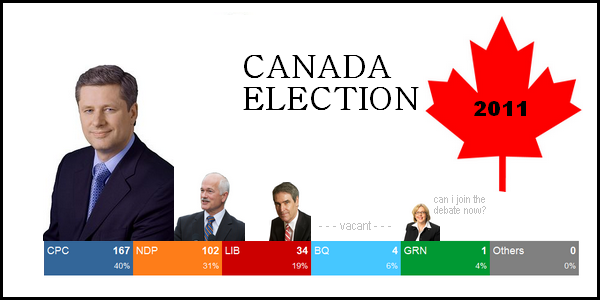
Good morning Canada, and welcome to a Conservative majority government!
This blog usually focuses on analyzing American pop culture trends, but I am just a big ole Canadian at heart and these political elections are always so fun to discuss afterwards. Of course, the 2011 election probably seems irrelevant and meaningless to any foreigners outside of Canada, especially since there aren't a lot of significant changes on the surface. Stephen Harper is still our reigning prime minister just like the past five years. The one small but notable difference is that the Conservative party now holds a majority government, which means they have more power and influence over the hot button federal issues in our country.
For those who aren't familiar with Canadian politics, here's a quick run-down of the political system: Canada is divided into 308 electoral districts based on approximate population density. Each district is represented by a Member of Parliament (MP) who must win their seat against other political parties in a popular vote. A majority government is achieved if at least 155 out of the 308 seats are represented by one predominant party; otherwise, the country holds a minority government instead. Yesterday, as of May 2nd 2011, the Conservative party took 167 seats in the most recent election, which makes Stephen Harper the triumphant leader of the majority government. He will remain as the Canadian prime minister for at least the next four years.
Unlike their American counterpart, Canadian elections are more than just a two-horse race. There are many political parties with vastly different values and platforms. The right-winged Conservative party is equivalent to the Republicans in the United States, although their platform matches more evenly with the American Democrats. The left-winged NDP party, led by Jack Layton, is the equivalent of the socialist political parties in Europe. In between the Conservatives and the NDPs are the centralist Liberal parties, which used to be the reigning champions until a recent collapse in power. There is also a Green Party, among other political affiliations in the running, although their influence on the general public is kept to a minimum.
Anyway, this article will focus on some of the more interesting recent trends that arose from the 2011 Canada election. The online Twitterverse and blogosphere was exploding with reactions over the results last night. I will attempt to be as impartial as possible in my writing (…we're doomed) and not let my political bias taint my trend analysis (doomed!)





